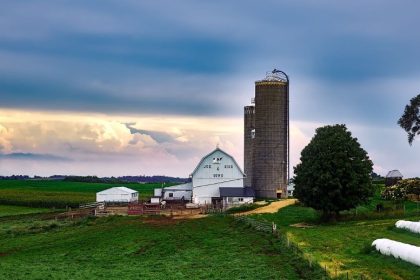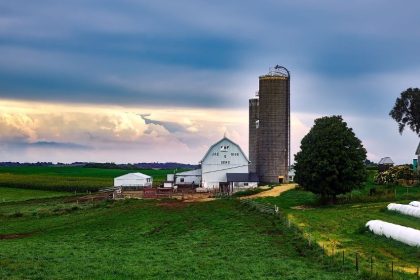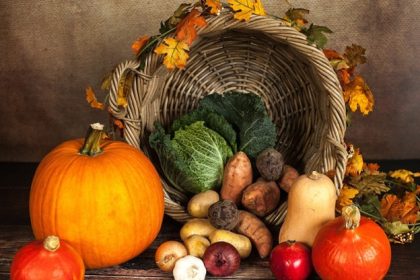House Republicans Urge Speaker to Move Quickly on Farm Bill

WASHINGTON — As House Speaker Mike Johnson, R-La., begins his first full week at the helm of the Republican Conference, a group of colleagues are urging him to quickly move on passing the next farm bill.
The previous farm bill, an omnibus, multiyear package that governs an array of agricultural and food programs, expired on Sept. 30, the close of the past fiscal year, and at a time when the House was paralyzed by the ouster of former House Speaker Kevin McCarthy, R-Calif., and a three-week search for his successor.
Shortly before securing the gavel, and previously reported in The Well News, Johnson laid out an aggressive agenda “to return to legislating” that included passing all of the outstanding House appropriations bills in November, and the farm bill during the first week of December.
A spokesperson for House Agriculture Committee Chairman Glenn “GT” Thompson, R-Pa., said the representative is “encouraged by Speaker Johnson’s aggressive agenda” but added that “it is important to acknowledge this agenda is based on the consensus of the Republican Conference.
“So, once floor time is secured, the committee will be ready to act,” the spokesperson said.
In a bid to drive that consensus more than 60 House Republicans last week penned a letter to Johnson, urging him to make good on his theoretical timetable and pass the farm bill before funding runs out for some of the key programs that fall under its umbrella.
“Americans today enjoy the safest, most abundant, and affordable food supply in the world. And we accomplish this despite a global market that is awash in high and rising foreign subsidies, tariffs, and other predatory, non-tariff barriers to free and fair trade,” the signers said in a letter sent to Johnson last Thursday.
“Simply put, farm and food security is national security,” the signers continued. “For a mere one-fifth of 1% of federal spending, the farm safety net, including commodity support programs and crop insurance, provides farmers and ranchers the foundation they need to manage risk, pass their farm or ranch down to the next generation, and continue producing the highest quality, lowest cost food, fuel, fiber, and forestry products in the world.”
“The farm bill is a critical agenda item that must be addressed by this Congress,” they said.
There are two principal expiration dates for the farm bill — the aforementioned end of the fiscal year, and the end of the “crop year,” generally considered Dec. 13, though it is pegged to the specific commodity being talked about.
The first expiration date matters most to those programs that require fiscal year authorizations; the second deadline is more impactful on things like crop subsidies and dairy support programs.
Once they expire at the end of the year, the law effectively reverts back to a version written nearly eight decades ago. And experts on the farm bill warn consumers could see the cost of staples, like milk, go up dramatically early next year as a result.
For programs with mandatory funding from the farm bill, operations cease after the funding expires.
Programs that get their funding through government appropriations, such as the Supplemental Nutrition Assistance Program and federal crop insurance, can continue on without a current farm bill.
In fact, though the Federal Crop Insurance Act is amended through the farm bill, it has a “permanent” funding authorization.
By comparison, SNAP, which puts food on the table for millions of Americans and currently makes up about 80% of the farm bill package, is always a political football and it promises to be one again this year.
To begin with, hardliners in the Republican Conference want to include work requirements for the public assistance program, something they successfully incorporated earlier this year in the deal to temporarily suspend the debt ceiling. Democrats simply won’t go for it.
And regardless of whether that provision is written into the farm bill, the same hard liners — many of them members of the staunchly conservative House Freedom Caucus — are calling for steep cuts to SNAP and conservation programs.
Another volatile issue this year is the proposed Ending Agricultural Trade Suppression (EATS) Act, a bill that targets California’s Proposition 12, a successful state referendum that banned the sale of agricultural products that do not meet the state’s anti-cruelty standards.
The proposition passed in 2018 with 63% of the vote and survived a subsequent Supreme Court challenge.
It essentially requires farmers to provide more space for egg-producing chickens, pigs and other livestock they raise, rather than keeping them in close proximity in pens.
Critics say the law sets a precedent for allowing states to impose rules on agricultural operations outside their borders and jurisdictions.
“California’s Proposition 12 is going to hurt the economy of Iowa, which is number one in pork production,” said Sen. Chuck Grassley, R-Iowa, in a statement when the EATS Act was introduced.
“Because we farm differently than the eggheads of California think we ought to run our animal agriculture, we can’t sell our product there,” the senator said.
Though other states have approved similar measures, Proposition 12 is the one that stings because California, among other things, accounts for nearly 15% of pork consumption in the United States.
While it is unclear whether the EATS Act will make it into the Farm Bill – it is controversial enough to have both bipartisan support and bipartisan opposition – chairman Thompson has said in the past that as the bill takes shape “every proposal and issue” will be evaluated “through the lens of fiscal accountability and political viability.”
Perhaps girding for the fight ahead, the letter signers noted that more than 92% of the nation’s planted acres are represented by Republican members and that in 2022, the food and agriculture sectors contributed $7.4 trillion in economic activity, creating 43 million jobs, $2.3 trillion in wages, $718 billion in tax revenue, and $183 billion in exports, stemming from direct, indirect and induced output.
“We urge you and the conference at-large to be united in ensuring swift passage of a strong farm bill that is written by farmers, for farmers, and by rural communities, for rural communities,” the signers wrote.
Dan can be reached at [email protected] and @DanMcCue
























